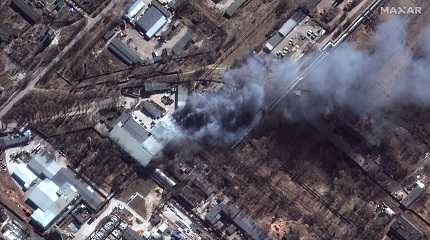
April 25 (Reuters) - Ukraine denied on Monday reaching an agreement with Russia on evacuating civilians from a steel plant in the southern city of Mariupol, and pushed for the United Nations to be the "initiator and guarantor" of any such deal.
Russia had said earlier on Monday that it would open a humanitarian corridor for civilians to leave the huge Azovstal steel plant where they are holed up with Ukrainian fighters and are under Russian attack.
"It is important to understand that a humanitarian corridor opens by the agreement of both sides. A corridor announced unilaterally does not provide security, and therefore is not a humanitarian corridor," Ukrainian Deputy Prime Minister Iryna Vereshchuk wrote on the Telegram messaging app.
Shortly after she made her comments, an aide to President Volodymyr Zelenskiy said Russian forces were attacking the steel plant from the air and with artillery and tanks.
Russian President Vladimir Putin had said last week that it was unnecessary to storm the plant, where the last Ukrainian defenders of Mariupol are hunkered down following two months of Russian siege and bombardment.
Ukraine has appealed for the United Nations "to be the initiator and guarantor of the humanitarian corridor from Azovstal for civilians", said Vereshchuk. She said officials from the United Nations and the International Committee of the Red Cross should be present when any corridor was established.
U.N. Secretary-General Antonio Guterres, who has been seeking a humanitarian truce in Ukraine, is due to meet Putin in Moscow on Tuesday and Zelenskiy in Kyiv on Thursday.
The Russian foreign ministry said Moscow intended to discuss issues related to Mariupol and the Azovstal plant with Guterres, Russia's RIA news agency reported.
Guterres met Turkish President Tayyip Erdogan on Monday and they "stressed the urgent need" for humanitarian corridors to evacuate civilians and deliver aid, the United Nations said.
However, Russia's deputy U.N. Ambassador Dmitry Polyanskiy said a truce would only allow Ukrainian forces to regroup.
"We don't think that a ceasefire is a good option right now," Polyanskiy told reporters, while also noting it was "not up to me to decide".
After deploying U.N. aid chief Martin Griffiths to Russia and Ukraine earlier this month, Guterres said on April 13 that a nationwide humanitarian ceasefire did not seem possible "at the present moment". He then called for a four-day pause in fighting for last weekend's Orthodox Easter, but was ignored.
Moscow, which describes its actions in Ukraine as a "special military operation", denies targeting civilians. It blames Ukraine for the repeated failure of humanitarian corridors.




